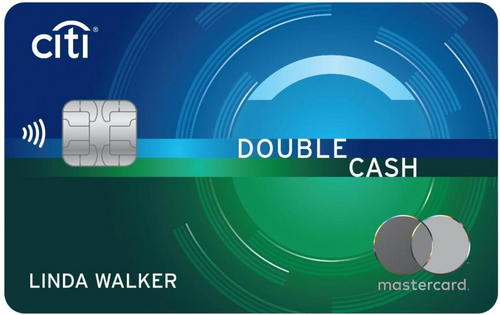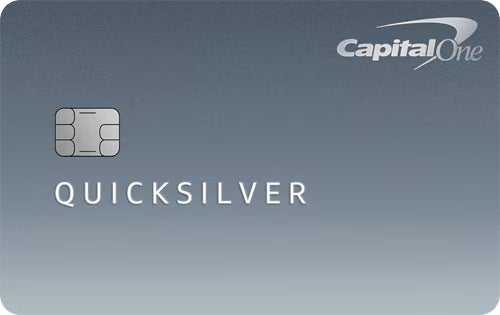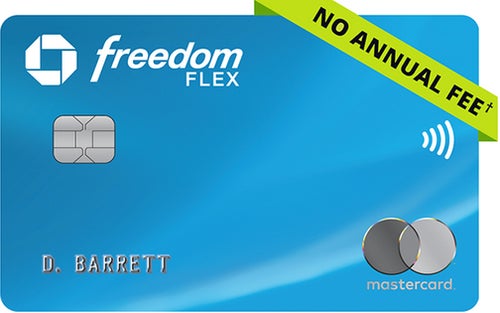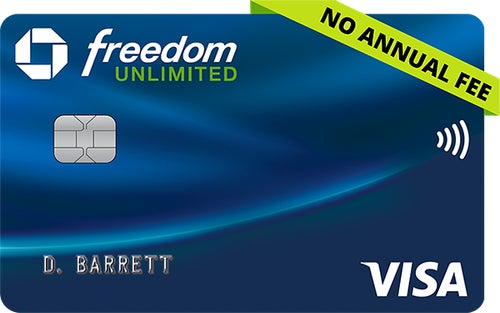| Cash Back Rating: | 5.0 / 5 |
| Rewards Value: | 5.0 |
| Annual Percentage Rate: | 2.0 |
| Rewards Flexibility: | 5.0 |
| Features: | 3.0 |
| Issuer Customer Experience | 4.0 |
In a Nutshell:
The Chase Freedom Unlimited® card offers a good sign-up bonus and an impressive average rewards rate, including a 1.5% cash back rate on general purchases, making it a great starter card for collecting Chase Ultimate Rewards.
Rewards Rate
|  |
Sign-up Bonus
|  |
Annual Bonus None |  |
Annual Fee $0 |  |
Average Yearly Rewards Value ($1,325 monthly spend) |  |
APR 18.24% - 27.74% Variable |  |
Rewards Redemption
Cons
|  |
Chase Customer Service Ratings
|  |
Other Notable Features: Car rental insurance, roadside assistance, extended warranty, trip cancellation and interruption insurance, lost luggage reimbursement, free credit score updated weekly, free DashPass membership for three months, followed by 50% off next nine months of membership
A longtime favorite for fans of cash back, the Chase Freedom Unlimited® not only offers a solid rewards rate on general purchases, but also boosted cash back in several everyday categories. Along with the card’s classic 1.5% cash back rate on general purchases, cardholders will enjoy outsized rewards on Chase Travel, dining and drugstore purchases.
Such practical bonus categories and a better-than-average cash back rate on general purchases should make it easy to earn plenty of rewards – no matter how you weigh your spending. Plus, Chase Ultimate Rewards cardholders will enjoy the flexibility to transfer points between cards, allowing point hackers to stockpile enough rewards for their next vacation in no time.
Pros and cons
Pros
- It offers a relatively long introductory APR period, so it can be an excellent choice for those who need time to pay down a balance without accruing interest.
- It has a generous welcome offer that helps boost rewards earnings
- It does not have a minimum redemption amount or a cap on cash back, so you have a greater opportunity to earn more rewards.
Cons
- It requires applicants to have good or excellent credit, so it may be difficult to be approved if your credit score is low.
- The card isn’t ideal for use when traveling abroad since it charges a 3 percent foreign transaction fee.
- You are required to use the Chase Travel portal when booking to earn your cash back rates, otherwise you will only earn the flat 1.5% rate.
Why you might want the Chase Freedom Unlimited Card
Even for those who don’t have any other Chase cards, the Chase Freedom Unlimited can still be a fantastic addition to your wallet due to its impressive cash back rewards, attractive welcome bonus and decent introductory APR offer.
Earn cash back on general purchases and bonus categories
The Chase Freedom Unlimited is on track to be an ideal choice for cardholders who want the best of both worlds: Not only do you earn 1.5% cash back on general purchases, but you’ll also get 5% back on travel purchased through the Chase Travel portal and 3% back on dining and on drugstore purchases.
This new rewards earning scheme is unique, as most cards that offer bonuses in specific spending categories limit you to a 1% cash back rate on general purchases. Based on the average consumer’s spending habits, we estimate that the Chase Freedom Unlimited now carries a terrific average rewards rate of just over 2% back. With an average spend of $15,900 per year, a consumer should earn around $328 per year in cash back with the Chase Freedom Unlimited, about $100 more per year than we’d expect with the card’s traditional cash back program. Of course, you could earn even more if you spend heavily in the card’s bonus categories.
Solid sign-up bonus
The Chase Freedom Unlimited currently has a welcome offer of a $200 bonus after you spend $500 in your first three months.
While the Chase Freedom Unlimited has featured more valuable welcome offers in the past, this latest bonus still offers solid value for the cost.
Flexible cash back redemption options
Once you’ve earned rewards, the Chase Freedom Unlimited is extremely flexible in how you redeem them, giving you plenty of different redemption options without any minimum to redeem for cash back. If you want to use your points for cash back, you can redeem them for either a statement credit or direct deposit into your bank account. You also have the option to use Freedom Unlimited points to pay for travel in the Chase Travel portal. Just keep in mind that your points might have a different value depending on how you choose to redeem.
Chase Freedom Unlimited redemption options
| Redemption option | Point value (cents) |
| Travel redemption | 1 |
| Statement credit | 1 |
| Direct deposit | 1 |
| Gift cards | 1 |
| Apple purchases | 1 |
| Amazon.com purchases | 0.8 |
You can also use the Chase Pay Yourself Back feature to redeem points to pay for some or all of your purchases in select categories and get paid back with a statement credit. You’ll still earn points on these purchases and your points may be worth more when you redeem in certain categories. For a limited time, Freedom Unlimited cardholders can redeem at a value of 1.25 cents per point when they opt to donate to eligible charitable organizations.
Long intro APR period for new purchases and balance transfers
The Chase Freedom Unlimited could also be useful if you need to strategically carry a balance in the short term. The card comes with a 0% intro APR on new purchases and balance transfers for the first 15 months (18.24% - 27.74% Variable thereafter), so if you have a big purchase to make that you’d like to pay off over time without incurring hefty interest charges, signing up for this card can be a great strategy. Plus, you can avoid racking up interest charges if you need to consolidate some debt and need time to pay it off. Keep in mind, you will need to pay a balance transfer fee of $5 or 3% of each transfer amount (whichever is greater) in the first 60 days. Just be sure to make a plan to pay off your balance before the introductory period ends, as the ongoing APR can be high.
Several cardholder perks
The Chase Freedom Unlimited comes with several perks that make it a valuable choice for frequent travelers. Here’s a quick look at some of the card’s benefits.
- Car rental insurance – For car rentals booked and paid for with your card, you can receive secondary coverage in the case of damage or theft.
- Purchase protection – If you purchase an item with your Freedom Unlimited and it is stolen or damaged in the first 120 days, you can be reimbursed up to $500 per claim (max $50,000 per account).
- Extended warranty – Add an extra year to qualifying manufacturer’s warranties of three years or less.
- Trip cancellation and interruption insurance – If you have to cancel or cut a trip short due to a covered circumstance such as severe weather or illness, you can be reimbursed for any non-refundable fares charged to your card.
To take full advantage of the card’s perks, put all major purchases on the Freedom Unlimited.
Why you might want a different card
Those looking for a cash back card with a straightforward rewards program, as well as those who spend frequently on restaurant and drugstore purchases, may find the Chase Freedom Unlimited card very appealing. It may also be a great choice for cardholders who want to maximize their earnings by pooling the rewards from multiple Chase cards. But it may not be ideal for consumers with poor credit, people who want to earn extra reward points on grocery or gas purchases or people who prefer a flat earnings rate instead of strategizing to max out bonus categories.
Strict approval odds
The Chase Freedom Unlimited is designed for users with good to excellent credit (above 670), so you’ll want to ensure you meet those qualifications before you apply. If you are worried about your eligibility and want to avoid a hard pull on your credit, you can also take advantage of tools like CardMatch™ to see if you’re matched for the offer.
Additionally, Chase is one of the strictest issuers when it comes to the number of accounts you can have open – holding new applicants to the 5/24 rule. This rule means if you have opened five or more credit cards with any issuer in the last 24 months, it is likely you won’t be approved for the card.
Not a great travel companion
While you’ll be able to earn big when you book travel through Chase Travel with this card, using it for purchases while at your international destination may not be the most cost effective. The Chase Freedom Unlimited charges a 3 percent foreign transaction fee, so every charge you make overseas will have this 3 percent fee added. This kind of fee can prove expensive in the long run, so be sure you have other cards you can use for purchases on your trip that don’t add this extra cost.
How does the Chase Freedom Unlimited compare to other cash back cards?
While the Chase Freedom Unlimited card offers a good flat rate of cash back for cardholders seeking simplicity, it does not offer the best rate you can find among cash back cards. Here’s a quick look at a few popular alternatives:
 |  |  |
Rewards rate
| Rewards rate
| Rewards rate
|
| Sign-up bonus | Sign-up bonus | Sign-up bonus
|
| Annual fee $0 | Annual fee $0 | Annual fee $0 |
Other things to know
| Other things to know
| Other things to know
|
Chase Freedom Unlimited vs. Citi Double Cash Card
For cardholders who prefer a flat rate of cash back to keeping track of bonus categories, the Citi Double Cash Card offers one of the highest earning rates you can get on every purchase. Cardholders earn 1% cash back on everything they buy, plus an additional 1% cash back as they pay for those purchases, for up to 2% back on every purchase.
See Related: Citi Double Cash Card vs. Chase Freedom Unlimited
Chase Freedom Unlimited vs. Capital One Quicksilver
Like the Chase Freedom Unlimited, the Capital One Quicksilver card offers a flat 1.5% cash back on every purchase. If you want to earn a flat rate on all purchases – but prefer Capital One to Chase – this card could be a great choice for you.
Chase Freedom Unlimited vs. Chase Freedom Flex
In addition to bonus rewards on Chase Travel, dining and drugstore purchases, the Chase Freedom Flex awards cardholders 5% cash back in rotating bonus categories that they must enroll in each quarter (on up to $1,500 in purchase per quarter). Cardholders also earn 5% cash back on travel purchases through the Chase Travel portal, 3% cash back on drugstore purchases and on dining and 1% cash back on other purchases. If you don’t mind putting a bit more maintenance into your credit card, this can be a very lucrative earning rate.
The Chase Freedom is also an excellent pair for other Ultimate Rewards cards, as you can transfer points between cards just like you can with the Chase Freedom Unlimited.
See Related: Chase Freedom Flex vs. Chase Freedom Unlimited
Pairing the Chase Freedom Unlimited with other rewards cards
Because the Freedom Unlimited card comes with a good flat rate of cash back on all purchases, it makes an excellent pair for other rewards cards that earn bonus points or cash back in particular categories. It makes a particularly good pair for other Chase Ultimate Rewards cards as it is easy to transfer points between them.
Plus, cards like the Chase Sapphire Preferred® Card get a higher point value when you redeem rewards for travel through the Chase Travel portal – meaning you can stretch your points a bit further by carrying both cards. Simply put all bonus category purchases on the Sapphire Preferred (the card earns 5X points per dollar on travel purchased through Chase Travel, 3X points per dollar on dining and 2X points per dollar on other travel purchases) and all other purchases on the Freedom Unlimited. Then, transfer all your points to the Sapphire to get more value out of them.
Additionally, Sapphire Preferred and Chase Sapphire Reserve® cardholders have the option of transferring points to one of Chase’s travel partners. Since many airline and hotel loyalty programs have an average point value higher than 1 cent per point, this strategy can be another way to get more from your rewards.
How to use the Chase Freedom Unlimited card:
- Use the card as your go-to for general purchases, especially at drugstores and on dining for the first year to take advantage of the increased rewards rate.
- Use the card for all Chase Travel bookings and on dining and drugstore purchases.
- Use the card for all Lyft rides.
- Consider pairing the card with another Ultimate Rewards card such as the Sapphire Preferred to get more value out of your Ultimate Rewards points.
- Take advantage of perks like Chase Offers and referral bonuses to earn more rewards.
Who should get the Chase Freedom Unlimited card?
- Cardholders looking for a good all-purpose cash back card that earns solid cash back on every purchase, plus bonuses in specific categories.
- Cardholders looking for a relatively easy-to-earn introductory offer.
- Cardholders who want to earn Ultimate Rewards without paying an annual fee.
- Frequent travelers who will take advantage of the card’s protections and insurances.
- You’re a frequent Lyft rideshare user.
Who should skip the Chase Freedom Unlimited card?
- Cardholders who want to earn bonus cash back rewards in categories such as gas, grocery stores and online shopping.
- Cardholders who have poor credit scores.
- Cardholders who prefer flat-rate cash back rather than bonus category cash back for maximum rewards.
Is the Chase Freedom Unlimited card right for you?
The Chase Freedom Unlimited should offer most cardholders an impressive average rewards rate and an easy way to earn solid cash back on every purchase. What really sets the card apart is the ability to transfer rewards to other Chase Ultimate rewards credit cards. If you are looking for a good card to pair with other rewards cards to maximize rewards potential, the Freedom Unlimited could definitely be worth it.
All reviews are prepared by CreditCards.com staff. Opinions expressed therein are solely those of the reviewer and have not been reviewed or approved by any advertiser. The information, including card rates and fees, presented in the review is accurate as of the date of the review. Check the data at the top of this page and the bank’s website for the most current information.
Responses to comments in the discussion section below are not provided, reviewed, approved, endorsed or commissioned by our financial partners. It is not our partner’s responsibility to ensure all posts or questions are answered.
Partner Offer
